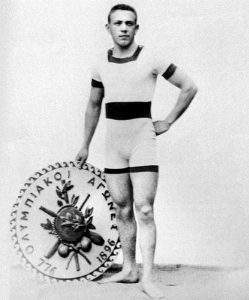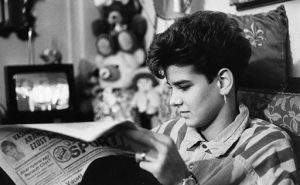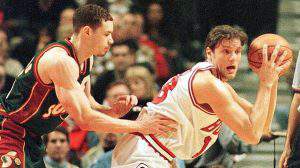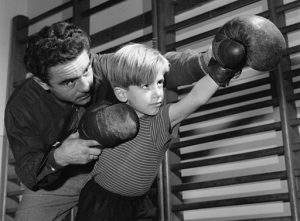We tend to say Hungarians are good at everything. A little bit of this, a little bit of that – the famous Hungarian ingenuity. Joking aside, we could say we have many talented people in various fields. This is true of athletes competing in many types of sports; we have a bunch of professionals to be proud of. The list is so long it would not fit one article, so I tried to choose five of the most legendary figures. Let’s take a look at them.
Ferenc Puskás (1927-2006), Football

If you say “Puskás” in any part of the world, people will immediately reckon who he is, but this is the first word almost everyone says when you tell them you are Hungarian. Puskás “Öcsi” is surely the number one football player of Hungarian football, an Olympic Champion and Silver medalist of the 1954 FIFA World Cup in Switzerland with the famous Golden Team. He played for Budapest Honvéd and Real Madrid during his club career, winning almost everything that was possible at that time, making him one of the most decorated players not just in Hungary but in the world as well:
5 Hungarian League and 5 Spanish League titles, 1 Spanish Cup title, 3 UEFA European Champion Clubs’ Cups.
And who could forget his famous pullback trick goal in Hungary’s 6-3 win over England at Wembley in 1952? See it from 2:40 in the summary of the “match of the century” below:
Unfortunately, he had to emigrate after the revolution of 1956 failed. He was seen as a deserter for a long time, it was even forbidden to say his name publicly, and he could only come home in 1981. His nickname was “Pancho” in Spain, but Hungarians called him “the Galloping Major” as he earned that rank during his service in the military. He died at the age of 79 in 2006.
Alfréd Hajós (1878-1955), Swimming/Football

He is one of the most versatile personalities of Hungarian athletes: he was a swimmer, a football player, a trainer, a referee and he even worked as an architect. The press called him “the Hungarian dolphin”. He swam between 1894 and 1896. He took part in the first modern Olympic Games in Athens in 1896.
He won both the 100 m and the 1200 m freestyle, thus winning the first and second Olympic gold medals of Hungary.
As a football player, he signed for Budapest TC in 1898 and played there until 1904, winning two Hungarian Leagues (1901, 1902). After finishing his university studies at Budapest University of Technology and Economics, he worked as an architect and opened his own office in 1907. He was quite successful in his profession as well, winning an Ybl Miklós Award and a silver medal in architecture at the 1924 Olympics in Paris. He died in 1955.
Krisztina Egerszegi (1974-), Swimming

Egerszegi, or “Egér”, as everyone calls her, is a five-time Olympic Champion and multiple time European and World Champion swimmer. She became the youngest Olympic Champion at the 1988 Seoul Olympic Games at the age of 14. That win in 200 m backstroke is one of the dearest victories in the history of Hungarian swimming.
She did not stop there and won four more Olympic golds: three in 1992 in Barcelona (200 m backstroke, 100 m backstroke, 400 m medley) and one in 1996, Atlanta (100 m backstroke). Egerszegi also won a silver in Seoul (100 m backstroke) and a bronze in Atlanta (400 m medley). She was the second of only three swimmers to win a gold for the same event in three consecutive Olympics. The other two are called Dawn Fraser and Michael Phelps.
She held many records both internationally and in Hungary as well. The best time for the 200 m backstroke was the oldest European record until 1 August 2009 when Russian swimmer Anastasia Zuyeva broke it at the 2009 World Aquatics Championships. She set up the Olympic 200 m backstroke record in 1988, but she improved it in 1992. This record was broken by Kirsty Coventry in 2008 in Beijing.
Kornél Dávid (1971-), Basketball

He is the first and only Hungarian basketball player to play in the NBA. He had 127 appearances in the Hungarian international team, and now he is the chairman of his former Hungarian club, Alba Regia. He was drafted by the Chicago Bulls in 1997, but was loaned out to the CBA side Rockford Lightning and then to Alba Székesfehérvár (now Alba Regia). He won the Hungarian Championship with them in 1998. He played for the Cleveland Cavaliers, the Toronto Raptors and the Detroit Pistons as well. He moved back to Europe with 109 NBA matches behind his back, but he was a starter only 11 times with a 5-point-average and 2.8 rebounds/game.
After coming back to Europe, he played in France, Lithuania and Spain as well. He played a crucial role in TAU Ceramica’s second place in the Euroleague. After retiring in 2008, he was appointed as the head of the international scouts at Phoenix Suns.
László Papp (1926-2003), Professional Boxer

He is one of the most famous boxers around the globe. Papp won three Olympic gold medals (London 1948, Helsinki 1952, Melbourne 1956) in middle and light-middleweight.
Even though he was neither black nor American and not even heavyweight, he is still considered as one of the best boxers in the world, alongside Muhammad Ali (Cassius Clay), Joe Louis and Iron Mike Tyson. Unfortunately, he could not fight for the world championship title due to political reasons, but he could win the European championship title. He fought as a professional 29 times from 1957 and won 27 times and tied twice, which means he remained unbeaten.
Fun fact: Hungarian international football players Ferenc Puskás and László Kubala paid the unemployed Castilians to cheer for him at his 1963 match in Madrid where he defended his European Championship title. When the Budapest Arena was built, they named it after Papp. The arena is the biggest closed sports venue in Hungary, the location of many cultural and sports events as well.
He died after a long illness in 2003.
Featured image: www.facebook.com/puskas.legenda